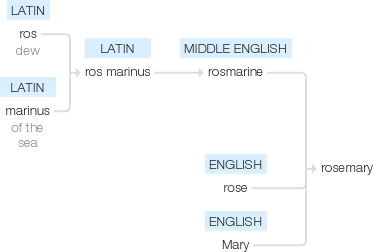Rosemary
Middle English rosmarine, based on Latin ros marinus, from ros ‘dew’ + marinus ‘of the sea’. The spelling change was due to association with rose1 and Mary1.
wiktionary
rose + Mary. From Middle English rosmary, rosemarye, alteration (based on rose + Mary) of earlier Middle English rosmarine, rosemaryn, partly from Old French rosmarin, partly directly from Latin rōsmarīnus(“rosemary”), from rōs(“dew, moisture”) + marīnus(“marine, of the sea”).
etymonline
rosemary (n.)
evergreen shrub native to southern Europe and widely cultivated for its fragrance, late 14c., rose-marie, earlier rosmarine (c. 1300), from Latin rosmarinus, literally "dew of the sea" (compare French romarin), from ros "dew" + marinus "of the sea, maritime," from mare "sea, the sea, seawater" (from PIE root *mori- "body of water").
Perhaps it was so called because it grew near coasts. The form was altered in English by influence of unrelated rose and Mary.
Latin ros is from a PIE noun probably from *ers- "to be wet" (source also of Lithuanian rasa, Old Church Slavonic rosa "dew," Sanskrit rasah "sap, juice, fluid, essence," Hittite arszi "flows," and perhaps also Rha, Scythian name of the River Volga (see rhubarb)).
